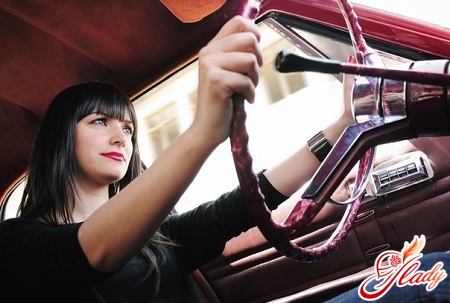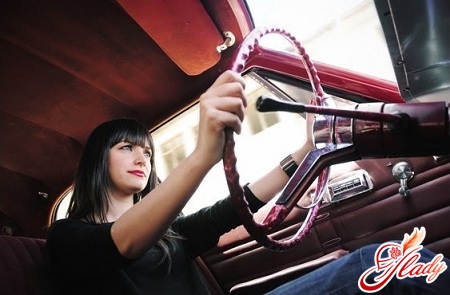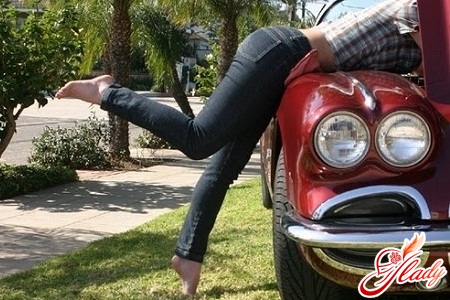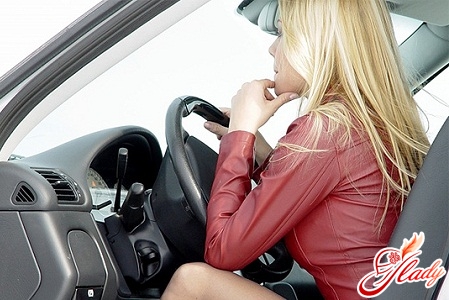 So, the driving school is over, all the examssuccessfully surrendered, the rights snugly settled in your pocket, and the car waits under the window. Go? The first independent journey on your car is always an explosion of a wide variety of emotions. What is there just not mixed! And the pride, and the joy of the fact that now you yourself will go where you want and no one else you no longer have a decree, and excitement (but how does it turn out all right?) And, of course, fear (and suddenly something will go wrong) ... The main thing - Do not let the alarm completely overwhelm yourself - she is a bad assistant. Indeed, what, in fact, is it so to worry about? There is nothing new in this world and at one time even the famous Schumacher, with the same timidity and excitement, approached his very first car. And to make the process of adaptation pass as easily as possible, simple advice to novice drivers will help. A little calmed down? Then you can start.
So, the driving school is over, all the examssuccessfully surrendered, the rights snugly settled in your pocket, and the car waits under the window. Go? The first independent journey on your car is always an explosion of a wide variety of emotions. What is there just not mixed! And the pride, and the joy of the fact that now you yourself will go where you want and no one else you no longer have a decree, and excitement (but how does it turn out all right?) And, of course, fear (and suddenly something will go wrong) ... The main thing - Do not let the alarm completely overwhelm yourself - she is a bad assistant. Indeed, what, in fact, is it so to worry about? There is nothing new in this world and at one time even the famous Schumacher, with the same timidity and excitement, approached his very first car. And to make the process of adaptation pass as easily as possible, simple advice to novice drivers will help. A little calmed down? Then you can start.
Preparing for a trip
Before you get into the car, take therule carefully examine it. Check that the wheels have not been lowered, whether scratches or dents have appeared on the body. It is especially important to do this if your car is standing on the street. Make sure that the caps and registration numbers are in place. Gently wipe the mirrors, glasses and lights. Everything is fine? Then sit down. A little trick - in order not to tempt thieves, barbers, get yourself a useful habit of first blocking the doors and only after that release the handbag from your hands. Make sure that the seat and the rear-view mirrors are set "as necessary", i.e. adjusted to suit you. Fasten your seat belt. Well, you can go! For the first independent trips it is better to choose some familiar route. It is desirable that traffic on it is not too lively. The most prudent usually "pass" it on foot, paying special attention to traffic signs and other "surprises". It seems that this is the right approach. After the first time, it will be very difficult for you to keep track of everything at once - and behind the car, and behind the road, and behind the signs. If you are afraid of independent travel, you can ask that the first few times with you, "ridden" more experienced driver. Only not a husband! He simply tortures you with "valuable guidance", advice, criticism and quibbles. It's better to take a reliable friend with a good driving experience. The main thing is that she is not a talker, and then only will be distracting. And now you absolutely do not need it. For the same reason, at first you should not include radio or music in the salon. A mobile phone on the time of the first trips it is better to completely disconnect. You will need all your attention.
"It's time to go-road ..."
One of the most common errors novicesis the desire to "cuddle" more tightly to the sidelines. This is understandable. The newcomer feels at the wheel uncertainly and is afraid of other cars and drivers, he is afraid to get into an accident. Therefore, it strives to become as unobtrusive as possible on the road. However, moving in the dense to the roadside, it is very easy to "run into" a piece of broken glass or a nail. And this is unlikely to cheer you up, right? Take your series and move calmly, keeping distance and interval. Try to rebuild as little as possible. When maneuvers do not forget to turn the turn signals. If the turn is made of several rows simultaneously, try to maintain the necessary radius and not "jump" into another row. With what speed to move? In theory, everything is perfectly clear - you must observe the flow rate. In practice, beginners throw "from the extreme to the extreme." Usually in the flow a novice driver is noticeable with the naked eye - he moves much slower than others. Quite often, this manner of driving leads to traffic congestion and congestion. This, of course, can not please other participants of the movement. Getting out of the speed of the flow you become a hindrance and interfere with drivers. There is another extreme. In free areas, when there are no other vehicles in the zone of visibility, a beginner, as a rule, can not resist the temptation a little "polyhachit". After all, you want to feel the speed and understand that you really can control this "beast". Therefore, feeling relatively safe, few people continue to be cautious. And this is very dangerous - you have not really learned how to operate the car at high speeds. And then anything can happen - you can "take out" on the oncoming lane or on some obstacle, enter, etc. Quite often such entertainment ends very sadly. 
Overtaking
Overtaking is one of the most dangerous maneuvers. Especially for an inexperienced driver. Of course, you learned the SDA well, otherwise how would you pass the exam? - And you know the rules of overtaking. In theory. However, in practice everything is not so simple. The most important advice - before you start a maneuver, think, is it really necessary? The first independent overtaking is recommended to be done only on an empty road or street, with good visibility and only if the transport in front of you simply "crawls." If the speed of movement corresponds to the rules established on this section of the road, from overtaking should be refrained. You still decided to overtake? Make sure that there are no cars on the "counter" and you are looking at a fairly large section of the road. Then surely around the corner on you will not jump to the oncoming truck. Only after this, confidently and calmly perform the maneuver. If you are overtaken, then do not increase the speed. After all, the other driver takes this parameter into account. If your speed changes, then he may not be able to complete overtaking and all this will end badly.
We're going to the gas station
About the fact that your car is "hungry", you canjudge by the fuel gauge located on the dashboard. On most cars near the scale of the device there is a special light bulb. It lights when the gasoline level drops to a certain value. However, such a "hint" is not on all machines, so you need to look after the arrow. The fact that the gasoline ends, you can find out by other symptoms. At sharp turns, dispersal or on liftings failure of draft begin. This means that it's time to go to the gas station. It is better to ask the neighbors, friends and colleagues ahead of time which of the gas stations located on your main routes are trading high-quality gasoline. Try to always refuel only on them. Carefully guide the car to the column. Naturally, with the side on which the hatch of the gas tank is located. Arriving at once, muffle the engine and in any case, do not smoke - at the gas station are very afraid of the fire. However, this is quite understandable. When an employee of a gas station comes up to you, tell him what gasoline your car "eats" - you know that, right? After that you have to go to the cashier. You can refuel the car to a full tank, buy a certain amount of liters or pour fuel for a certain amount - as you prefer. Be sure to take a check and in any case do not lose it. At least until the next refueling. First, it helps to avoid gasoline shortage, and this sometimes happens. Secondly, if there are any troubles with your car due to low-quality fuel, it will serve as proof that you were refueling at this gas station. And what if no one is in a hurry to come to your aid and "feed" your pet? Well, then you have to take everything in your hands. Take the refueling gun and carefully insert it into the neck of the gas tank. Push the lever under the handle of the gun. Look at the scoreboard, located in front of you - see, there "ran" the numbers? They denote the amount of fuel already poured into the gas tank, and its price. When the tank of your car is full, the latch should automatically snap off. If there is no latch, carefully follow the process. As soon as you see that the gasoline begins to foam at the neck, immediately release the lever. Do not try to pour gasoline right up to the lid. After all, if you mis-calculate, you will piss yourself and the car. What to do if you "missed" the moment and gasoline in the car almost ended? If the engine stalls, do not try to start it again and again - it's bad for a gasoline pump. In this situation it is better to move to the roadside and turn off the ignition. What to do next? Strictly speaking, there are only two options - either you bring gasoline to the car, or take the car to the "feeder". The simplest thing is to ask for help from one of your friends. You can, of course, take the help of drivers passing by, ready to share their fuel with you. But this is quite dangerous - low-quality gasoline, drained from someone else's tank, can cause serious damage. And, most likely, this case will be recognized not as insurance.
First breakdown
Well, sooner or later it happens withby all. The main thing - without panic. As soon as you felt "wrong" - turn on the "emergency" and try to move to the shoulder. If you can not do this, immediately put up an emergency stop sign - this can save your life. Especially if you stood behind some hill or a sharp turn. Now you have two options - to try to find someone who will take you out on a wire or call an evacuator. Decide, of course, you. The cable is cheaper and faster. But this "journey" requires certain skills. Are you sure that you have them? If, no matter what, you dare to do it, remember the "golden rule" 50x50. What does it mean? This means that most cars with automatic transmission can be towed for a distance, no more than 50 kilometers, with a speed not exceeding 50 km / h. Your main task is to monitor the tension of the cable. There should be no jerks, otherwise you just fly into the rear bumper of your "savior". Another unpleasant moment - if in your car there is a hydraulic booster of the brakes and the steering wheel, then you will be surprised to find that it was very difficult to apply the brake pedal, and suddenly the steering wheel became incredibly heavy. Well, you have to "sweat" - boldly press the pedal with all his might. You can even have two legs. But keep the brake pedal depressed all the time is not recommended - so she can refuse at all. Too complicated? Then call the tow truck! You have a phone recorded, right? Of course, this pleasure is not cheap. But - this is a guarantee that both you and your car will get to the place intact and safe. And what could be more important than this? 
First date
Well, it happened with you - you stoppedInspector of the State Traffic Safety Inspectorate. The main thing is not to be nervous! Most likely, this is just a formality. What should I know? You have every right not to leave the car and communicate through the window without unlocking the doors. Try to look calm and affable - it always produces a favorable impression. If you still broke something, do not try to prove your innocence. Usually, traffic police officers know very well which offenses are most often committed on a particular section of the road. If you have not committed anything "criminal", then directly on the spot you will receive a special decree-receipt. You can pay it in any branch of the Savings Bank. The more severe cases are dealt with in special "analysis groups", and the measure of your responsibility will be established already in court. In some situations, you will only receive a protocol, and you will be informed about the time and place of consideration of the case by registered mail. If you are sure that the traffic police officer is not right, and you did not break anything, you can try to defend your position. Here you will be helped by a good knowledge of the traffic rules and the table of existing penalties. Try to explain to the inspector the logic of your actions, referring to these documents. Only do not shout, do not wave your hands and, of course, do not insult anyone. Firstly - it's just plain ugly. Secondly, most likely the traffic police officer knows all the rules much better than you and, if desired, can greatly "spoil" your life. If the inspector decided to draw up a protocol, and you, as before, feel that you are not guilty of anything - boldly state your position. Write in the minutes: "I do not agree". Describe your version. Try to get witnesses ready to confirm your words. If you extort a bribe, unreasonably take documents or threaten - call the traffic police confidence. Here, perhaps, and all the basic tips for novice drivers. It is not so difficult to follow them, right? A skill - it will necessarily come with practice. The main thing is to believe in yourself and not be afraid. Have a good trip!









